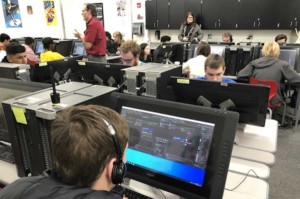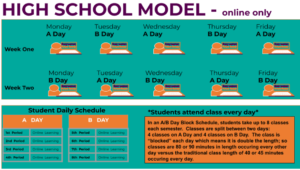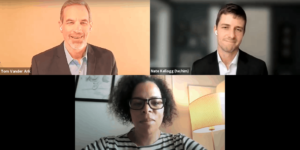Why Three Districts Chose Chromebooks Over Tablets

This morning three districts announced that they were going 1:1 next year with Chromebooks, the full sized web appliance from Google. The districts include Council Bluffs, Iowa; Leyden, Illinois; and Richland Two, South Carolina. Representatives from the districts joined Google officials in making the announcement this morning at FETC, the giant Florida education technology conference.
It’s about learning. These districts are buying Chromebooks, but this initiative isn’t about computers. “We wanted to have 1) engaged student learners, 2) improved student learning, 3) project and problem based learning and 4) equity of access,” said Donna Teuber, Technology Integration Coordinator for Richland.
Brian Weinert, Leyden tech director, said, “We want to create equal access to educational opportunity.” For many students in the high school district, the 3G Chromebooks will extend learning and access to instructional resources.
“The Chromebooks combined with Google Apps for Education are moving us to a project and problem based classroom environment where students have control of their own learning and are given choices in how they approach a project,” said Teuber, Technology Integration Coordinator for Richland School District 2. “Students are working collaboratively, communicating with others outside of the classroom, and publishing to audiences around the world.”
“We want our students to be self-directed learners,” said David Fringer, Council Bluffs tech director, and “we want them working collaboratively across the web.”
Jason Markey, an assistant high school principal, said “The Chromebooks have changed the way we work together as administrators by creating online anytime professional learning network.”
“Our students are becoming the teachers and our teachers are letting go of control and learning from their students,” said Teuber. “Teachers and district staff are also become more collaborative and are always sharing what they’re learning.”
To tap or type? When planning a high access environment, an important question is tablets or laptops? Tablets, especially iPads, have received a lot of attention recently. They’re great for some things, but I still think of tablets as consumption devices and laptops as production devices. Some kids can type on a tab but if teachers want kids to write a lot and to produce media, they need a keyboard. Chromebooks have the instant on and long batter life of tabs but with a full keyboard and the functionality of a laptop.
A less apparent difference is that Chromebooks are fully web-centric and are not locked in to one family of mobile apps. When instructional resources, portfolios, and communication streams are all web based, they are available any where on any screen.
Teachers in Richland and Council Bluffs make extensive use of Edmodo to make and manage content-rich assignments and to facilitate student and professional collaboration.
During his FETC keynote, Rajen Sheth, Product Manager for Chromebooks in Education, also showed off the Desmos graphic calculator and social stories created on Storify.
The districts are confident that Chromebooks will be less expensive to maintain. The tech directors appreciate that they allow no-touch setup, have security built in, and is constantly refreshed and customized from the cloud. I just like the idea of kids writing a lot and do it in a collaborative environment where a teacher can jump in and comment on a Google doc in progress.
Richland, Leyden, and Council Bluffs think of students as producers not consumers. They think Chromebooks provide the perfect platform for writing, producing, collaborating, and learning.
For more see the Google blog on the announcement and the SFGates story: Google’s Chromebooks making big school push
The blog fist appeared on Huffington Post. Disclosures: Edmodo and Desmos are portfolio companies of Learn Capital where Tom is a partner.






Richard Tapia
Would you be generous enough to try and convince my principal to buying some Chromebooks? I've tried about three times already and they won't listen to me. Most kids at school think I'm crazy because all I talk about is Google this and Google that. If feeling extra happy or in a good mood would you donate to the school please? Thank so much